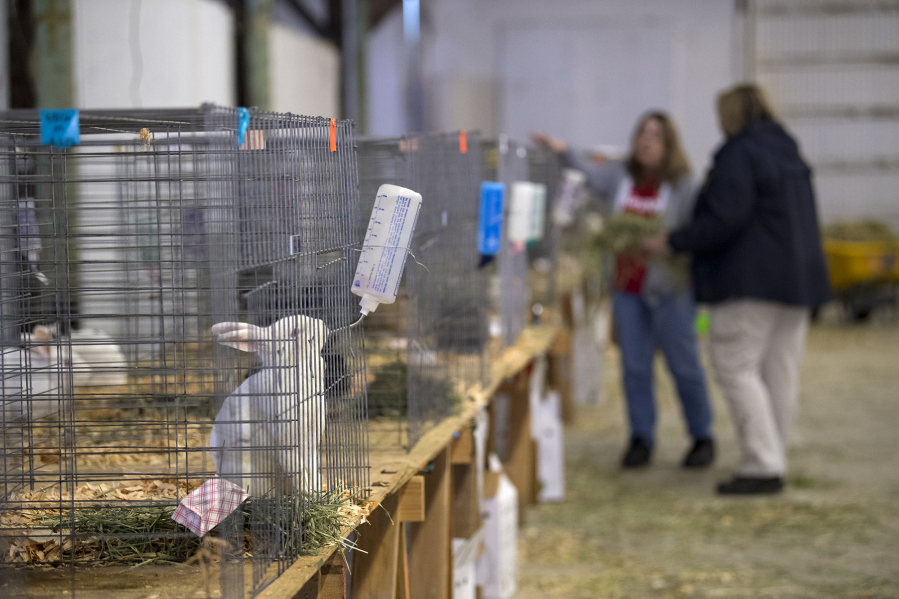Lisa Feder recalled how the workday was winding down on March 10 at the Humane Society for Southwest Washington when she received a phone call about a situation that was both adorable and urgent.
Feder, the Humane Society’s vice president for shelter operations, said that on that Friday afternoon, Clark County Animal Control contacted the nonprofit regarding a family (she doesn’t know their name) who found themselves overwhelmed and ready to surrender their 23 chickens, 21 guinea pigs and 107 rabbits. The county contracts with the Humane Society for sheltering services, and Feder said that it helps out with animal hoarding situations that periodically arise.
But Feder said those situations have typically involved cats and dogs. This influx of animals presented a particular challenge that she and other staff at the Humane Society have been working on nonstop for nearly two weeks.
“We’re really not equipped to house animals other than dogs and cats for a long-term basis,” said Feder. The Humane Society typically handles one or two rabbits at a time.
After getting the call, Humane Society workers and animal control officers lined up feed, cages, hay and other supplies needed to care for the animals, Feder said. Using cargo vans and Animal Control Manager Paul Scarpelli’s large SUV, Feder said, the rescued animals were then transported to the Clark County Event Center at the Fairgrounds. The small animal barn there is equipped to handle dozens of rabbits, chickens and guinea pigs during the annual fair, but this is the first time the fairgrounds has been pressed into service for a rescue.
Once they arrived, staff checked the health of each animal and created records documenting its condition. The animals overall were healthy, and none had to be euthanized, she said. At night, staff from the Humane Society and animal control took turns camping out to keep an eye on the situation.
Nearly two weeks later, the guinea pigs have gone to a rescue facility in Portland and the chickens to a farm the Humane Society works with occasionally. There are no similar options for the rabbits, and Feder said the Humane Society will try to find permanent homes for them. But first, the rabbits will need to be spayed and neutered.
“It’s absolutely true about rabbits,” Feder said of their reputation for being prolific breeders. “They have a 30-day gestation period. We know that we have some pregnant rabbits already, so that is a priority so we don’t have more rabbits.”
Wileen Carlton, veterinary technician for the Humane Society, said that rabbits metabolize the anesthetic used in sterilization surgeries much differently than cats or dogs. As a result, she said, rabbits require more monitoring and take longer to sterilize.
“We could probably do five cats in the time it takes us to do a single rabbit,” added Feder, who said that nearly 40 bunnies have been sterilized so far and that she expects the rest of the surgeries to be concluded by next week.
By then, enough space at the animal shelter should be cleared for the bunnies. After that, she said, they’ll be adopted out.
In the meantime, they’ll wait at the fairgrounds, reclining on wood chips in their individual cages while munching on Timothy hay and sipping water from bottles. Feder said that none of the rabbits have names and have instead been assigned numbers.
The rabbits are of many different breeds, small and large. Denise Barr, Humane Society vice president of marketing, said that rabbits at the fairgrounds include lionheads, New Zealands, Californians and standard Rex.
Barr said that the Humane Society has been in touch with local 4-H clubs, whose members have experience raising rabbits, about adopting them. She described many of the rabbits as being friendly and “very adoptable” and that the Humane Society will hold an adoption event next month.
Scarpelli couldn’t be reached for comment. Feder said she doesn’t know the details about the family that gave up all the animals.
“The reality is, this type of thing can get out of hand very quickly, and I think the family did the right thing by letting us take the rabbits and get them a new home,” she said. “So we don’t want to give them a negative light.”




